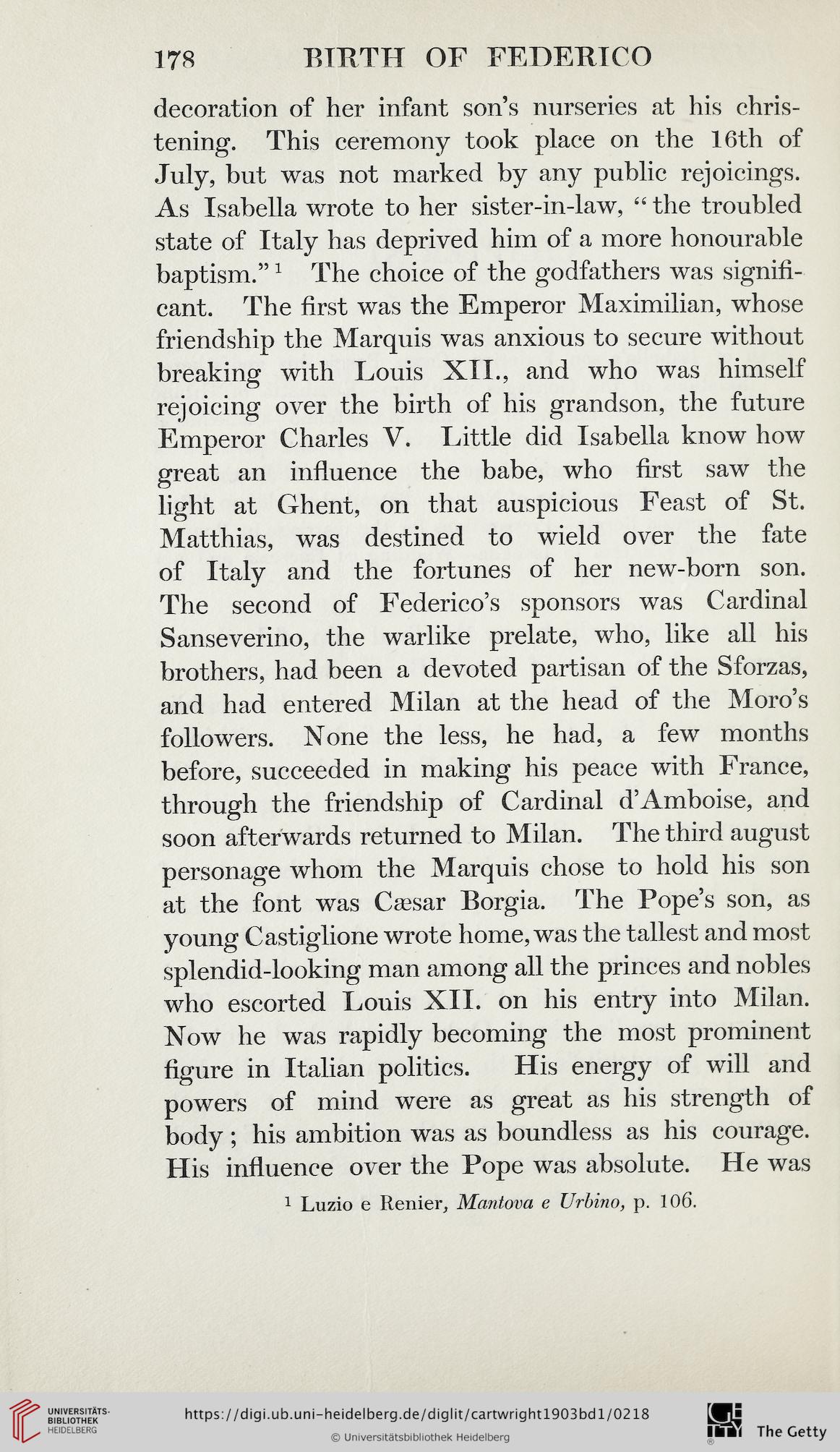178 BIRTH OF FEDERICO
decoration of her infant son’s nurseries at his chris-
tening. This ceremony took place on the 16th of
July, but was not marked by any public rejoicings.
As Isabella wrote to her sister-in-law, “ the troubled
state of Italy has deprived him of a more honourable
baptism.”1 The choice of the godfathers was signifi-
cant. The first was the Emperor Maximilian, whose
friendship the Marquis was anxious to secure without
breaking with Louis XII., and who was himself
rejoicing over the birth of his grandson, the future
Emperor Charles V. Little did Isabella know how
great an influence the babe, who first saw the
light at Ghent, on that auspicious Feast of St.
Matthias, was destined to wield over the fate
of Italy and the fortunes of her new-born son.
The second of Federico’s sponsors was Cardinal
Sanseverino, the warlike prelate, who, like all his
brothers, had been a devoted partisan of the Sforzas,
and had entered Milan at the head of the Moro’s
followers. None the less, he had, a few months
before, succeeded in making his peace with France,
through the friendship of Cardinal d’Amboise, and
soon afterwards returned to Milan. The third august
personage whom the Marquis chose to hold his son
at the font was Cassar Borgia. The Pope’s son, as
young Castiglione wrote home, was the tallest and most
splendid-looking man among all the princes and nobles
who escorted Louis XII. on his entry into Milan.
Now he was rapidly becoming the most prominent
figure in Italian politics. His energy of will and
powers of mind were as great as his strength of
body; his ambition was as boundless as his courage.
His influence over the Pope was absolute. He was
1 Luzio e Renier, Mantova e Urbino, p. 106.
decoration of her infant son’s nurseries at his chris-
tening. This ceremony took place on the 16th of
July, but was not marked by any public rejoicings.
As Isabella wrote to her sister-in-law, “ the troubled
state of Italy has deprived him of a more honourable
baptism.”1 The choice of the godfathers was signifi-
cant. The first was the Emperor Maximilian, whose
friendship the Marquis was anxious to secure without
breaking with Louis XII., and who was himself
rejoicing over the birth of his grandson, the future
Emperor Charles V. Little did Isabella know how
great an influence the babe, who first saw the
light at Ghent, on that auspicious Feast of St.
Matthias, was destined to wield over the fate
of Italy and the fortunes of her new-born son.
The second of Federico’s sponsors was Cardinal
Sanseverino, the warlike prelate, who, like all his
brothers, had been a devoted partisan of the Sforzas,
and had entered Milan at the head of the Moro’s
followers. None the less, he had, a few months
before, succeeded in making his peace with France,
through the friendship of Cardinal d’Amboise, and
soon afterwards returned to Milan. The third august
personage whom the Marquis chose to hold his son
at the font was Cassar Borgia. The Pope’s son, as
young Castiglione wrote home, was the tallest and most
splendid-looking man among all the princes and nobles
who escorted Louis XII. on his entry into Milan.
Now he was rapidly becoming the most prominent
figure in Italian politics. His energy of will and
powers of mind were as great as his strength of
body; his ambition was as boundless as his courage.
His influence over the Pope was absolute. He was
1 Luzio e Renier, Mantova e Urbino, p. 106.




